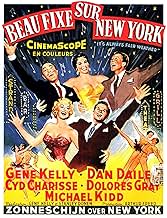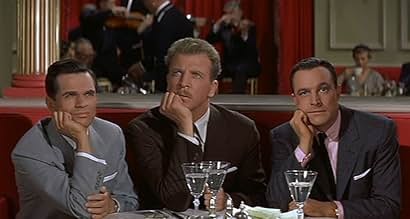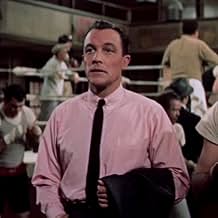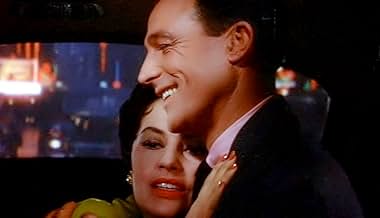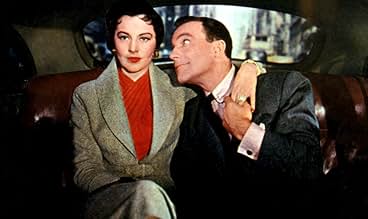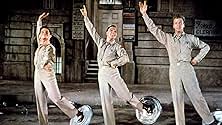CALIFICACIÓN DE IMDb
7.0/10
4.1 k
TU CALIFICACIÓN
Tres soldados se reúnen diez años después de su último encuentro en Nueva York para descubrir que ya no tienen mucho en común.Tres soldados se reúnen diez años después de su último encuentro en Nueva York para descubrir que ya no tienen mucho en común.Tres soldados se reúnen diez años después de su último encuentro en Nueva York para descubrir que ya no tienen mucho en común.
- Nominado a 2 premios Óscar
- 3 nominaciones en total
David Ahdar
- Dancing Boxer
- (sin créditos)
Betty Arlen
- Girl
- (sin créditos)
Phil Arnold
- Butch - Assistant at Stillman's Gym
- (sin créditos)
Sybil Bacon
- Woman on Skates
- (sin créditos)
Walter Bacon
- Bartender
- (sin créditos)
Jimmy Baird
- Child Dancer
- (sin créditos)
Tom Bernard
- Page
- (sin créditos)
Rodney Bieber
- Dancing Boxer
- (sin créditos)
Madge Blake
- Mrs. Stamper
- (sin créditos)
Willie Bloom
- Bar Patron
- (sin créditos)
Argumento
¿Sabías que…?
- TriviaGene Kelly bought the roller skates for the "I Like Myself" number down the block from his house at Pioneer Hardware on Beverly Drive. He also mentioned that the skates were not altered in any way; they weren't locked to his shoes, so when he tapped in them, he had no help.
- ErroresIn the 1945-1955 montage, the shot of the 1953 New Years Eve crowds at Times Square shows Cuando muere el día (1941) at the Criterion Theatre, so it's obviously New Years Eve 1941-1942 footage.
- Citas
Doug Hallerton: There must be some more dignified way to sell Klenzrite... like you, taking a bath in it, stark naked in Macy's window.
- ConexionesEdited into American Masters: Gene Kelly: Anatomy of a Dancer (2002)
- Bandas sonorasMarch, March
(1955) (uncredited)
Music by André Previn
Lyrics by Betty Comden and Adolph Green
Performed by Gene Kelly, Michael Kidd (dubbed by Jud Conlon) and Dan Dailey
Opinión destacada
It's Always Fair Weather will go down in history as the film musical which "could have been". Had it been made a few years earlier it could have been in the same leagues as Singin' In the Rain and On the Town but several shortcomings, some determined by the period the film was made prevent it from being so. Even the studio had that little faith in it they dumped it as a second feature alongside Bad Day At Black Rock.
It's Always Fair Weather differs from other musicals of its time in its sombre tone with the tale of three war buddies who are reunited ten years later to find out they can't stand each other upon discovering one is a hick, a snob and a goon. This is juxtaposed to a world of beautiful, bright colours and welcome artificiality with urban sets to die for. It's Always Fair Weather was originally conceived as a sequel to On the Town, reuniting Gene Kelly with co-stars Frank Sinatra and Jules Munshin. However, by 1955, Munshin no longer had box office credibility while Sinatra was too big a star that the studio was unwilling to work with him. In their place, we get Dan Dailey and Michael Kidd, both of whom get the job done but lack the same electric chemistry Kelly's On the Town co-stars possessed. Frank Sinatra in particular I find is sorely missed as I loved his three-picture partnership with Kelly in which they made an excellent comedic duo. None the less the roaster does get a big boost with the casting of the great Cyd Charisse, whom like Ann Miller in On the Town, plays a glamorous woman with contradictory personality and an encyclopedic knowledge of well, pretty much any topic.
However, I find It's Always Fair Weather's biggest drawback are the sections of the film which are uneventful and doesn't have the lightning-fast pace of On The Town or Singin' In The Rain. The film could definitely benefit from the trimming or removal of whole scenes; there is a faster-paced, snappier film in here. The film does help make up for this though in its musical numbers. It's Always Fair Weather does showcase some of the best moments of any MGM musical with the soundtrack being one of the best in the MGM catalogue. The musical numbers and compositions are fantastic and all written for the film itself by the great Betty Comden and Adolph Green, while the majority of MGM musicals took their songs from their back catalogue as well as other stage musicals.
The five-minute Gershwin like dance number "The Binge" showcases the then-new cinemascope format by having three dancers occupy their own third of the screen as they dance and create percussion with trash can lids on their feet as they work together in great physical tandem of drunken joy. Once Upon a Time, on the other hand, is a heart aching number if there was one as the three men sing about their broken dreams while Music is Better Than Words couldn't be more enchanting if you asked for it. The centrepiece of the film, however, is Gene Kelly's number 'I Like Myself', featuring him tap dancing on roller skates, no trickery! Like Singin' In the Rain, the number is an encapsulation of pure happiness (just look at the faces of the onlooking extras). This is of my favourite musical numbers of all time and is an unbelievable display of talent if I ever saw it. The film's only crime in the song and dance department is the lack of a dance number between Gene Kelly and Cyd Charisse, despite one actually being filmed.
I feel widescreen technology came too late the MGM musicals which could have used it to great advantage but by 1955 musicals had already lost most of their economic viability due to the rise of television. It's Always Fair Weather is Hollywood coming to terms with the existence of its rival television but relishes the opportunity to satirize the format as superficial and ridden with advertising.
It's Always Fair Weather differs from other musicals of its time in its sombre tone with the tale of three war buddies who are reunited ten years later to find out they can't stand each other upon discovering one is a hick, a snob and a goon. This is juxtaposed to a world of beautiful, bright colours and welcome artificiality with urban sets to die for. It's Always Fair Weather was originally conceived as a sequel to On the Town, reuniting Gene Kelly with co-stars Frank Sinatra and Jules Munshin. However, by 1955, Munshin no longer had box office credibility while Sinatra was too big a star that the studio was unwilling to work with him. In their place, we get Dan Dailey and Michael Kidd, both of whom get the job done but lack the same electric chemistry Kelly's On the Town co-stars possessed. Frank Sinatra in particular I find is sorely missed as I loved his three-picture partnership with Kelly in which they made an excellent comedic duo. None the less the roaster does get a big boost with the casting of the great Cyd Charisse, whom like Ann Miller in On the Town, plays a glamorous woman with contradictory personality and an encyclopedic knowledge of well, pretty much any topic.
However, I find It's Always Fair Weather's biggest drawback are the sections of the film which are uneventful and doesn't have the lightning-fast pace of On The Town or Singin' In The Rain. The film could definitely benefit from the trimming or removal of whole scenes; there is a faster-paced, snappier film in here. The film does help make up for this though in its musical numbers. It's Always Fair Weather does showcase some of the best moments of any MGM musical with the soundtrack being one of the best in the MGM catalogue. The musical numbers and compositions are fantastic and all written for the film itself by the great Betty Comden and Adolph Green, while the majority of MGM musicals took their songs from their back catalogue as well as other stage musicals.
The five-minute Gershwin like dance number "The Binge" showcases the then-new cinemascope format by having three dancers occupy their own third of the screen as they dance and create percussion with trash can lids on their feet as they work together in great physical tandem of drunken joy. Once Upon a Time, on the other hand, is a heart aching number if there was one as the three men sing about their broken dreams while Music is Better Than Words couldn't be more enchanting if you asked for it. The centrepiece of the film, however, is Gene Kelly's number 'I Like Myself', featuring him tap dancing on roller skates, no trickery! Like Singin' In the Rain, the number is an encapsulation of pure happiness (just look at the faces of the onlooking extras). This is of my favourite musical numbers of all time and is an unbelievable display of talent if I ever saw it. The film's only crime in the song and dance department is the lack of a dance number between Gene Kelly and Cyd Charisse, despite one actually being filmed.
I feel widescreen technology came too late the MGM musicals which could have used it to great advantage but by 1955 musicals had already lost most of their economic viability due to the rise of television. It's Always Fair Weather is Hollywood coming to terms with the existence of its rival television but relishes the opportunity to satirize the format as superficial and ridden with advertising.
- mmallon4
- 19 oct 2014
- Enlace permanente
Selecciones populares
Inicia sesión para calificar y agrega a la lista de videos para obtener recomendaciones personalizadas
- How long is It's Always Fair Weather?Con tecnología de Alexa
Detalles
Taquilla
- Presupuesto
- USD 2,771,000 (estimado)
- Total a nivel mundial
- USD 1,309
- Tiempo de ejecución1 hora 41 minutos
- Color
- Relación de aspecto
- 2.55 : 1
Contribuir a esta página
Sugiere una edición o agrega el contenido que falta

Principales brechas de datos
By what name was Siempre hay un día feliz (1955) officially released in India in English?
Responda

